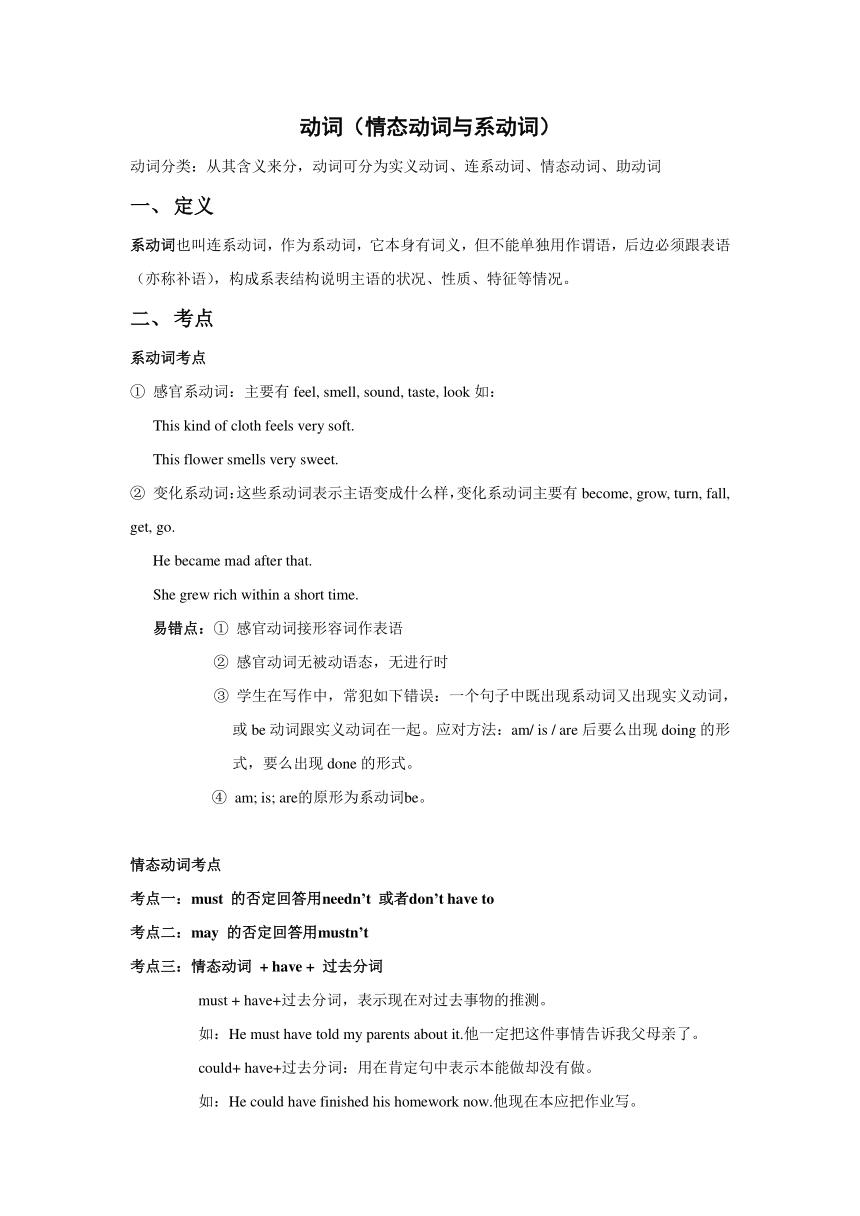
动词(情态动词与系动词) 动词分类:从其含义来分,动词可分为实义动词、连系动词、情态动词、助动词 定义 系动词也叫连系动词,作为系动词,它本身有词义,但不能单独用作谓语,后边必须跟表语(亦称补语),构成系表结构说明主语的状况、性质、特征等情况。 考点 系动词考点 ① 感官系动词:主要有feel, smell, sound, taste, look如: This kind of cloth feels very soft. This flower smells very sweet. ② 变化系动词:这些系动词表示主语变成什么样,变化系动词主要有become, grow, turn, fall, get, go. He became mad after that. She grew rich within a short time. 易错点:① 感官动词接形容词作表语 ② 感官动词无被动语态,无进行时 ③ 学生在写作中,常犯如下错误:一个句子中既出现系动词又出现实义动词,或be动词跟实义动词在一起。应对方法:am/ is / are后要么出现doing的形式,要么出现done的形式。 ④ am; is; are的原形为系动词be。 情态动词考点 考点一:must 的否定回答用needn’t 或者don’t have to 考点二:may 的否定回答用mustn’t 考点三:情态动词 + have + 过去分词 must + have+过去分词,表示现在对过去事物的推测。 如:He must have told my parents about it.他一定把这件事情告诉我父母亲了。 could+ have+过去分词:用在肯定句中表示本能做却没有做。 如:He could have finished his homework now.他现在本应把作业写。 should have done sth.本应该做某事,而事实上并没有做。否定句表示“不该做某事而做了”。 如:You should have been more careful in this experiment. 考点四:must 表示肯定推测;can’t 表示否定推测 考点五:need 既可以做情态动词又可以做实义动词。 实义动词 need 的用法: need sth. need to do need doing = need to be done 主动表被动 needn’t + have+过去分词表示过去做了没必要做的事情。 如:You needn’t have taken it seriously. 这件事情你不必太认真。 注意: need 否定为 ① doesn’t / don’t need to do; ② needn’t 考点六:had better do sth表示“最好” had better 相当于一个助动词,它只有一种形,它后面要跟动词原形。 如:It is pretty cold. You’d better put on my coat. She’d better not play with the dog. 注意:had better do sth.-- had better not do sth. 考点七:would rather表示“宁愿” would rather do 宁愿,宁可 would rather not do 宁愿不做 would rather do A than.do B..宁愿……而不愿 三、动词难点与易错点 难点一:be used to doing sth.; used to do sth.; be used to do sth be used to doing sth 表示习惯做某事,to 后面动词用-ing形式;used to do sth 表示常常做某事。如: I’m used to getting up early. 我习惯早期 I used to get up at six in the morning.我过去经常在早上六点起床。 Pens are used to write 钢笔被用来写字。 易错点:这条河过去很脏。The river used to be dirty, 很多考生误写为:The river used to dirty.(少写系动词be的形式) 难点二:arrive; get 和 reach 表示“到达”时的区别 arrive in +大地点,arrive at+ 小地点,get to + 地点名词,reach 是及物动词,后边直接跟地点名词。 We arrived at the village at five in the afternoon. 我们下午五点到达那个小村庄。 When did you arrive in Beijing? 你们是何时到北京的啊? How do you usually get to school? 你通常怎么到学校? When she reached the office, the teacher was having a short rest. 当她到达办公室时,老师正在休息。 注意: home; there; here, abroad, upstairs, downstairs 等做 ... ...
~~ 您好,已阅读到文档的结尾了 ~~

